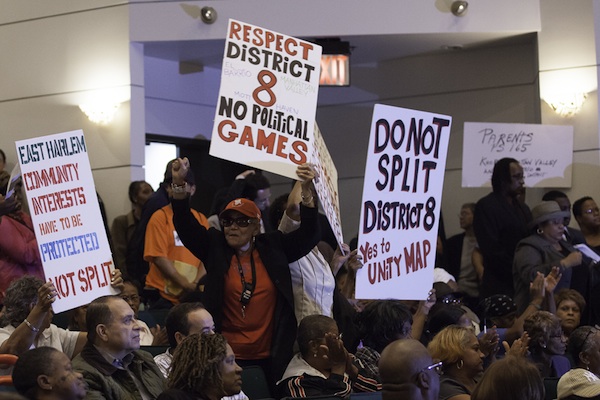
Photo by: Taleen Dersdepanian
Protesters at an October hearing on proposed changes to City Council districts voice their concerns over redrawn lines for the East Harlem district represented by Melissa Mark-Viverito. A revised proposal is now under consideration.
The journey of Puerto Ricans—from migrants who arrived at the beginning of the city’s industrial decline to participants in the new ethnic awareness resulting from the national liberation movements of the ’60s and ’70s—defined the trajectory the “pioneer” Latino generation and its immediate successors. Demographic changes hinted that the time for a Latino mayor should have arrived in the late ’90s, after the precedent set by Mayor David Dinkins for blacks, and coinciding with the revelation that Latinos would become the city’s and the country’s largest non-white minority.
But then the neoliberal rhetoric that has permeated not only our government and schools but also corporate and non-profit workplaces shifted our political discourse toward a merger of business and political goals that de-emphasize nationalism and ethnicity, even ideology. This general tendency was crystallized at the climax of the 2001 campaign, in the wake of the 9-11 attacks, when Ferrer’s Two Cities campaign was seen as irrelevant or even in bad taste amid a perceived need for the city to “come together” in a way that eliminated—or, rather, overlooked—group interests and loyalties.
However, despite the emergence of a political language that devalues ethnic labels, ethnic politics is alive and well in New York. Theorists like Matt Barreto, author of Ethnic Cues: The Role of Shared Ethnicity in Latino Political Participation, point out that Latinos’ conception of “shared ethnicity”—based on a shared language, common immigrant experience, general reaction to discrimination and other factors—can strongly influence their voting behavior. So strong is one particular “cue” Barreto highlights—the Spanish surname–that much of the Latino political world of Brooklyn was shaken to the core when State Assemblyman Vito Lopez, who is really an ethnic Italian with one grandparent of Spanish descent, was caught up in a massive sexual harassment scandal this summer. Barreto suggests the perceived low rate of Latino political participation is not as low compared with other groups when there is the presence of viable Latino candidates.
So, in some senses, ethnic politics or Latino candidacies are not important in the same way they were during the height of what one could call the ethnic succession era; in others ways, they are as important as ever. What has changed is that now, many candidates strategically maintain a sense of ethnic or national identity while engaging in the creation of new political coalitions, some of which are based on race and ethnicity, but others on different shadings of class, ideology, gender and even sexual preference.
In general, a new narrative is forming in the New York Latino political community. It suggests that Puerto Rican-based identity politics, while still important, is diminishing in importance, and that machine-based or family-centric models of power are at least imperfect, if not destructive to community interest. It sees a newer group of second- or third-generation immigrants—highly educated, somewhat technocratic elected officials—emerging because of their willingness to engage a broader sector of voters.








